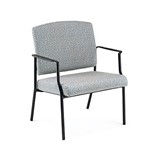This was despite the high expectations held for the $1 billion system that many thought had the potential to completely revolutionise healthcare in Australia.
Set up by the Labor government in 2011, Personally Controlled E-Health Records' (PCEHR) purpose was to improve patient care by allowing healthcare providers and practitioners to access and share patient information seamlessly on one commonly-used system. A patient's eHealth record contains information such as when healthcare was received, hospital stays, details of GP visits, and medical test results.
High-hopes were pinned on its future popularity with former Health Minister Tanya Plibersek saying the government was predicting an estimated half a million users by mid-2013. Plibersek asserted the PCEHR "will mean easier and faster access to patient information" and called upon doctors to make a concerted effort and adopt the system unanimously.
The numbers don't add up
However less than three years later, instead of the predicted boom in user numbers of doctors and aged care patients alike, it seems this promising initiative may have actually swollen to the size of a great big white elephant.
Only a scant number of doctors had added a Shared Health Summary (the critical step in the setup process), and only a fraction of Australians had signed up and established their record, the government admitted in a statement.
The low figures were not conducive to a national, electronic system whose very purpose was to "help save lives", the government asserted, and announced a review to hopefully make the system more fit for purpose and cost effective.
But is it fair to say the PCEHR has become a colossal sinking ship, or perhaps even more relevant – despite the hype and the government's high hopes – had it coming all along?
Ignorance not so blissful
Not altogether so, but part of the problem is there's a lack of awareness among seniors about its potential benefits and an unwillingness to embrace digital technology, according to National Seniors chief executive Michael O'Neill.
"Many older people, particularly those in their 70s and 80s, have grown up without computers and have little interest – or confidence – in learning to use such technology," he told IndustrySearch.
"Those who don't trust technology are unlikely to want a personally-controlled electronic health record, instead are more likely to rely on their health professional to look after them. The system needs to be better sold to consumers."
While better education among seniors may be the key to its success in the near future, the system should in theory not only be of benefit to aged care patients, it should be regarded as a necessity, according to Santo Gazzo, general manager of Advantech Australia, a company specialising in cutting-edge information technology for the healthcare sector.
"The question that should be asked is: how well have the benefits and virtues of eHealth records been promoted to the public and the medical profession?" Gazzo said.
"eHealth records can benefit older Australians as it provides safer, quicker and more efficient care – in particular where emergency care is required or where access to historical data can be the difference between life or death.
"One of the difficulties in providing safe, quality care is the quick availability of accurate medical records, including past medical history and current medication.
He added the benefits of a electronic records system used by all could even open the door to more seamless communication through portable IT devices used by healthcare professionals.
"Mobility devices such as tablets and PC pocket pads can be used by GPs or nurses to quickly access patient data. A combination of these two technologies could be used when a specialist conducts a home-care or aged-care home visit," Gazzo said.
"When an aged care person is being assessed by different medical professionals such as in an emergency ward, or by a specialist or GP such information is vital.
"The introduction of eHealth records would provide not only greater efficiencies to the industry but also safe, quality care for the elderly."


